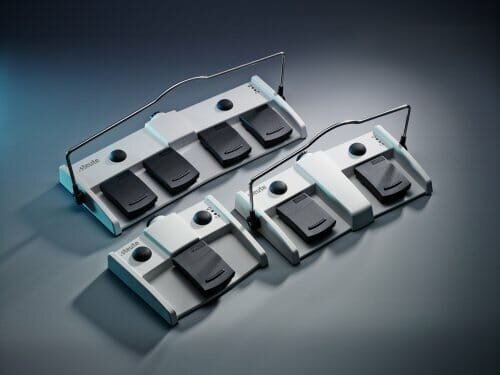Wireless foot control with SDC interface
At the DMEA, a prototype with SDC interface (picture 2) was shown on the OR.NET booth. It is currently in operation as a user interface in a demonstrator for the dynamic integration of medical devices in the OR.technology used by the new steute user interfaces means that, for the first time, lithium-ion rechargeable batteries can be replaced by conventional alkaline batteries (e.g. AA or C). Recharging is therefore no longer necessary, significantly reducing the cost of charging management and eliminating the cost of a charging device altogether.medical devices in the OR: this is the goal pursued by the OR.NET association, and a milestone has now been reached. At the DMEA 2019, OR.NET presented its “Service-oriented Device Connectivity” (SDC) standard. And the latest wireless foot controls from steute Meditec are compatible with the new SDC interface.One of the benefits of integrating several medical devices in the OR via a joint control unit is that the surgeon can concentrate better on the surgery being performed. Communication between the different devices also improves OR routines: all relevant information can be displayed and processed at all times.
For these reasons, an open standard facilitating dynamic integration is very attractive for surgeons and surgical staff. Such a standard was presented at the DMEA 2019 for the first time. It was developed by members of the registered association OR.NET e.V., which in 2016 succeeded the lighthouse project OR.NET, founded in 2012, and continued to pursue its envisaged goal – the safe and open integration of computer-based medical equipment.
This standard, called “Service-oriented Device Connectivity” (SDC), facilitates the combined operation of medical devices from different manufacturers. Integration takes place at the level of the control unit, which therefore assumes a key function.
As a founding member of OR.NET, the steute business unit steute Meditec is committed to the development of cross-manufacturer standards. Its latest range of wireless foot controls (picture 1), presented for the first time at the Medica 2018, is therefore already compatible with SDC and the dynamic integration it will bring.
These wireless foot controls are available in one to four-pedal versions and as a new standard range complement the existing user interfaces from steute Meditec. Signals are transmitted to the medical devices by the latest version of a wireless technology which steute developed especially for this purpose. It features significantly lower power consumption in conjunction with high (and adjustable) transmission performance. Despite its low energy requirement, the reaction time is extremely short: signal transmission from an active foot control takes only 20 milliseconds, while controls in the energy-saving deep-sleep mode need just 50 to 60 milliseconds upon actuation to wake up and transmit a fully functioning signal.
The low-energy wireless technology used by the new steute user interfaces means that, for the first time, lithium-ion rechargeable batteries can be replaced by conventional alkaline batteries (e.g. AA or C). Recharging is therefore no longer necessary, significantly reducing the cost of charging management and eliminating the cost of a charging device altogether.
www.steute.co.uk








